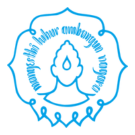Meta Analysis the Effect of Electronic Health-based Self Management in Controlling Blood Pressure in Hipertensive Patients
Abstract
Background Consistent application of self-management is important in efforts to improve the quality of life and health status of hypertensive patients. Electronic health is here to facilitate self-management of hypertensive patients and provide health information to health workers in real time and promote lifestyle modifications. The purpose of this study was to analyze the influence of electronic health-based self-management on blood pressure control in hypertensive patients.
Subjects and Method: : This study is a meta-analysis using PICO namely Population: Hypertensive patients; Intervention: Self-management based on electronic health; Comparison: No self-management based on electronic health; Outcome: Systolic and diastolic blood pressure. This study uses articles from several databases, i.e Pubmed, Google Scholar, Science Direct and the Cochrane Library using the following keywords “Hypertension” OR “Hypertensive” OR “Blood Pressure” OR “High Blood Pressure” AND “Self Management” OR “Self Care” OR “Self Monitoring” AND “Electronic Health” OR “eHealth” OR “Telemedicine” OR “Telehealth” OR “mHealth” OR “Mobile Health” OR “Mobile Application” OR “Message Text” OR “Phone Calls”. Articles included in the research are articles that use English with an RCT study design whose publication is within the period of 2012-2022. The steps in the systematic review are carried out based on the PRISMA flow diagram guidelines. Quantitative analysis was carried out using Review Manager (Revman) 5.3.
Results: There were 9 articles from South Africa, America, South Korea, Spanish, England, Scotland, and Honduras, with a sample size of 3,071 hypertensive patients concluded that electronic health-based self-management could reduce systolic blood pressure by 0.38 units and was statistically significant (SMD= -0.38; 95% CI = -0.55 to -0.20; p<0.001 ). The meta-analysis synthesized 9 studies with a total sample size = 2.095 hypertensive patients concluded that electronic health-based self-management could reduce diastolic blood pressure by 0.21 units and was statistically significant (SMD= -0.21; 95% CI = -0.29 to -0.12; p< 0.001).
Conclusion: Electronic health-based self-management can reduce systolic and diastolic blood pressure control in hypertensive patients.
Keywords: Self management, electronic health, blood pressure, hypertension
Correspondence:Aulia Siti Nur Rahmah. Masters Program in Public Health, Universitas Sebelas Maret, Jl. Ir. Sutami 36A, Surakarta 57126, Central Java. Email: rahmaaulia500@gmail.com. Mobile: 08156865373.
Journal of Health Policy and Management (2023)
https://doi.org/10.26911/thejhpm.2023.08.02.04
How to Cite
References
Boitchi AB, Naher S, Pervez S, Anam MM. (2021). Patients’ understanding, management practices, and challenges regarding hypertension: A qualitative study among hypertensive women in a rural Bangladesh. Heliyon. 7(7):1-9. Doi: https://doi.org/10.1016/j.heliyon.2021.e07679.
Chandler J, Sox L, Kellam K, Feder L, Nemeth L, Treiber F (2019). Impact of a culturally tailored mhealth medication regimen self management program upon blood pressure among hypertensive hispanic adults. Int J Environ Res Public Health. 16(7):1–13.Doi: 10.3390/ijerph16071226.
Gong K, Yan YL, Li Y, Du J, Wang J, Han Y, Zou Y., et al (2020). Mobile health applications for the management of primary hypertension: A multicenter, randomized, controlled trial. Medicine J. 99(16):15-19. Doi: https://doi.org/10.1097/MD.0000000000019715.
Kaplan AL, Cohen ER, Zimlichman E (2017). Improving patient engagement in self-measured blood pressure monitoring using a mobile health technology. Heal Inf Sci Syst. 5(1): 1–9. Doi: https://doi.org/10.1007/s1375501700269.
Kementerian Kesehatan RI (2018). Riset Kesehatan Dasar 2018. Kementerian Kesehatan Republik Indonesia. 1–100. http://www.depkes.go.id/resources/download/info-terkini/hasil-riskesdas-2018. [ Diakes 01 September 2022].
Ko D, Bratzke LC, Roberts T (2018). Self-management assessment in multiple chronic conditions: A narrative review of literature. Int J Nurs Stud. 83(2): 83–90. Doi: https://doi.org/10.1016/j.ijnurstu.2018.04.009.
Lee CC, Enzler CJ, Garland BH, Zimmerman CJ, Raphael JL, Hergenroeder AC, Wiemann CM (2021). The development of health self management among adolescents with chronic conditions: an application of self determination theory. J Adolesc Heal. 68(2): 394–402.Doi: https://doi.org/10.1016/j.jadohealth.2020.05.053.
Lee HY, Kim JY, Na KY, Yeon H, Han J, Pak Y, Nam B,Pae CH (2018). The role of telehealth counselling with mobile self-monitoring on blood pressure reduction among overseas Koreans with high blood pressure in Vietnam. J Telemed Telecare. 25(4): 1–8.Doi: https://doi.org/10.1177/1357633X18780559.
Logan AG (2013). Transforming hypertension management using mobile health technology for telemonitoring and self-care support. Can J Cardiol. 29(5): 579–585. Doi: https://doi.org/10.1016/j.cjca.2013.02.024.
Morawski K, Ghazinouri R, Krumme A, Lauffenburger JC, Lu Z, Durfee E, Oley L, et all., (2018). Association of a smartphone application with medication adherence and blood pressure control: The MedISAFE-BP random-ized clinical trial. JAMA InternalMedicine.178(6): 802–809. Doi: https://doi.org/10.1001/jamainternmed.2018.0447
Nolan RP, Liu S, Shoemaker JK, Hachinski V, Lynn H, Mikulis DJ, Wennberg RA, et all., (2012). Therapeutic Benefit of Internet-Based Lifestyle Counselling for Hypertension. Can J Cardiol. 28(3): 390–396. Doi: https://doi.org/10.1016/j.cjca.2012.02.012.
Olsen M, Angell S, Asma S, Boutouyrie P (2016). A call to action and a lifecourse strategy to address the global burden of raised blood pressure on current and future generations: the Lancet Commission on. Lancet. 388:(10060): 2665–2712. https://www.thelancet.com/journals/lancet/article/PIIS0140676(16)311345/fulltext.
Pan F, Wu H, Liu C, Zhang X, Peng W, Wei X (2015). Effects of home tele-monitoring on the control of high blood pressure: a randomised control trial in the Fangzhuang Community Health Center , Beijing. Aust J Prim Health. 10(3): 1-5. Doi: 10.1071/PY17187.
Persell SD, Peprah YA, Lipiszko D, Lee JY, Li JJ, Ciolino JD, Karmali KN, et all., (2020). Effect of home blood pressure monitoring via a smartphone hypertension coaching application or tracking application on adults with uncontrolled hypertension:A Randomized Clinical Trial. JAMA Netw open. 3(3): 20-25. Doi: https://doi.org/10.1001/jamanetworkopen.2020.0255.
Toro RT, Kim Y, Wood M, Rajda J, Niejadlik K, Honcz J, Marrero D, et all., (2017). Efficacy of a mobile hypertension prevention delivery platform with human coaching. J Hum Hypertens. 31(12): 795–800. Doio: https://doi.org/10.1038/jhh.2017.69.
WHO (2013). Hypertension Prevention, Diagnosis, and Treatment. 0–43. [Diakses 01 September 2022]
WHO (2021). Hypertension. https://www.who.int/healthtopics/hypertension#tab=tab_1 [Diakses 20 Desember 2022]
Yardley L, Morrison L, Bradbury K, Muller I (2015). The person-based approach to intervention development: Application to digital health-related behavior change interventions. J Med Internet Res. 17(1): 30-35. Doi: https://doi.org/10.2196/jmir.4055





